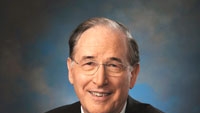With new administration comes change for broadcasters

With the election of Sen. Barack Obama as the nation’s 44th president comes a sea change in American politics — one that will profoundly affect the nation’s broadcasters. From the make-up of the FCC to a more solid Democrat majority in Congress, expect new policies to come in 2009.
The effects from the 2008 election, coupled with the DTV transition next February and a continually poor economy, may make the New Year one for broadcasting’s history books.
The president-elect was expected to name attorney Henry Rivera to head a transition team focused on the FCC. Rivera is a partner in Wiley Rein LLP, a prominent communications law firm in Washington, D.C. He served at the FCC from 1981 to 1985 under FCC chairman Mark Fowler.
The Government Accounting Office has identified the upcoming DTV transition as an “urgent policy concern” for the incoming administration. It was expected that Rivera would put together a team to monitor the transition.
With Republican Kevin Martin expected to soon be out of his FCC chairmanship, there’s speculation that President Obama will appoint Democrat FCC member Michael J. Copps as the new FCC chairman. Copps began serving his second FCC term in 2006. He’s been a Democrat activist on the FCC and was formerly chief of staff for former Senator Ernest F. Hollings of South Carolina.
Although the same Democrats still lead most congressional committees, there’s change in Congress that will affect broadcast issues. Sen. Ted Stevens, in a still undecided razor close race for re-election in Alaska, could return to the Senate, but may face expulsion as a result of his conviction of felony charges for failing to report gifts. Though in the minority party in Congress, Stevens has long been a strong ally of broadcasters.
After the conviction, Sen. Kay Bailey Hutchison, a Texan, replaced Stevens as ranking Republican on the Commerce committee. Even if Stevens returns to the Senate, Hutchison will probably retain the committee seat.
The professional video industry's #1 source for news, trends and product and tech information. Sign up below.
Sen. Gordon Smith, a Republican member of the Senate Commerce Committee from Oregon, lost his Senate seat to Democrat Jeff Merkley. Add to that Sen. John Sununu, a Republican Commerce committee member from New Hampshire. He lost to Democrat Gov. Jeanne Shaheen. Neither Smith nor Sununu, however, were major allies to broadcasters.

A big win for broadcasters was the Democrat failure to oust Senate Minority Leader Mitch McConnell of Kentucky. McConnell, a close friend of broadcasters, was in a tough race for his seat. He retained it by a hair.
As of late last week, Democrats had won 57 seats in the Senate, three short of the 60 needed to prevent a filibuster. That could go higher when the winner of the Stevens race in Alaska is determined, and when the results are in from the Minnesota Senate contest, in which Democrat Al Franken is in a dead heat with Republican Norm Coleman. That race is so close a recount is being conducted.
And, in Georgia, Republican Saxby Chambliss is in a Dec. 2 runoff race.
In the House, Democrats extended their control to about an 80-vote majority. Less than a day after the election, Rep Henry Waxman, a California Democrat, said he will challenge Rep. John Dingell of Michigan for the chairmanship of the House Committee on Energy and Commerce. It will be major fight.
That committee oversees broadcasting issues. However, the race for the chairmanship has little to do with broadcasting, because the committee also handles health care, alternative energy, climate change and even restoring stability to financial systems — all critical to President-elect Obama’s agenda.
On many of these issues, House Speaker Nancy Pelosi is more closely aligned ideologically with Waxman than with Dingell, and Waxman is seen as an ally of the Speaker while Dingell is not.
Otherwise, Democrat Commerce committee members will all return, but at least five Republicans will no longer be on the committee. These include Barbara Cubin of Wyoming, Heather Wilson of New Mexico, Chip Pickering of Mississippi, Mike Ferguson of New Jersey, and Vito Fossella of New York. All chose not to run for re-election.
There also may be some organizational shifts as the new Congress is reorganized. For example, Sen. Robert Byrd, the ailing 90-year-old chairman of the Senate Appropriations Committee, may step aside to allow Sen. Daniel Inouye of Hawaii to take the chairmanship.
This could open the way for West Virginia’s Sen. Jay Rockefeller to chair the Commerce Committee. Rockefeller has never been a friend to broadcasters.
